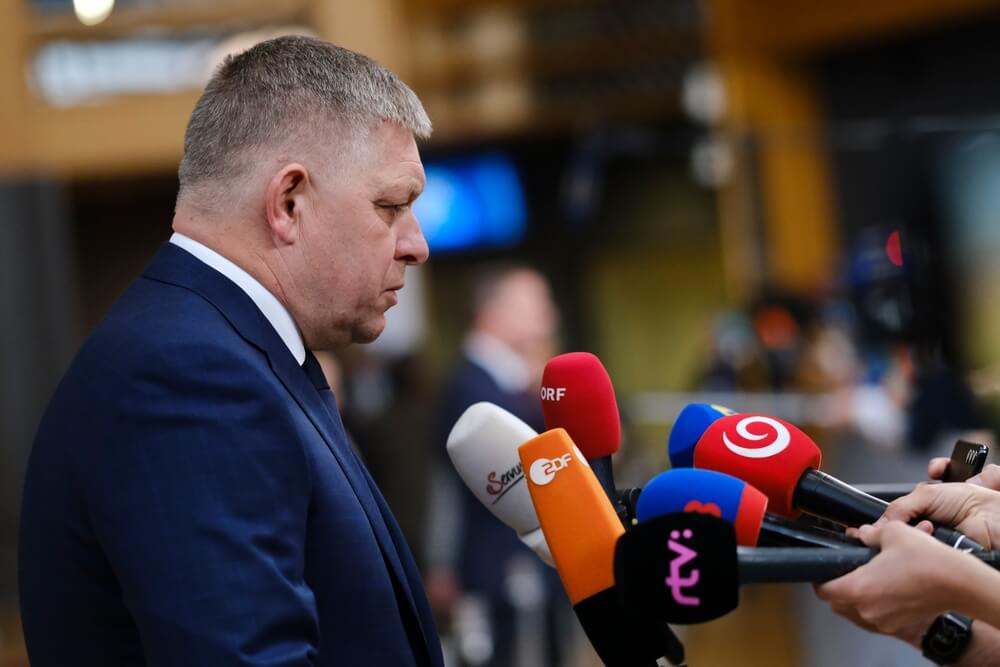Unofficial reports state that Slovakian Prime Minister Robert Fico will meet Vladimir Putin in Moscow next week to discuss the possible suspension of Russian gas deliveries as early as 1 January.
Ukraine's decision to not extend the contract with the Russian state-owned company Gazprom for the transit of gas to European consumers will affect Slovakia, among several other EU member states.
"In the coming days, including during the Christmas holidays, you may witness exceptionally intense negotiations at various levels and in different countries, starting as early as next week,” Fico said last week.
At the start of the Russian invasion of Ukraine, Slovakia was one of the EU countries that imported 100% of its gas requirements from Russia. Since then, this dependency has only decreased slightly, so that the country still imports around three billion cubic metres from the Russian state energy giant Gazprom, which corresponds to the majority of its needs.
Slovakia will be the most affected market in the group of European markets, along with Hungary and partially Austria, as Ukraine has decided not to extend the contract for the transit of Russian gas after 1 January.
However, Austria already terminated its partnership with Gazprom at the end of November and, like the rest of the EU, switched to non-Russian gas suppliers.
Russian and Ukrainian losses
Given that Ukraine is the final pipeline corridor for Russia's gas transportation to European consumers, the blockade of transit through Ukraine poses a significant challenge, potentially resulting in a reduction of USD 6.5 billion in revenue for the Kremlin.
On the other hand, Ukraine has taken a risk with its decision, which will cost it around 0.5% of its GDP in the form of unrealised transit fees. The decision also carries the risk of the gas pipeline becoming a target for Russian bombing raids, a scenario that has not yet occurred, remaining without significant infrastructure potential.
Kyiv insists that it will not allow anything that could fill the Russian military budget with billions of dollars
However, Kyiv insists that it will not allow anything that could fill the Russian military budget with billions of dollars.
"We won't allow them to earn additional billions on our blood. And any country in the world that can get something cheap from Russia will eventually become dependent on Russia—whether it happens in one month or one year. That's their policy," said Ukrainian President Volodymyr Zelensky.
At the same time, he rejected Slovakia and Hungary's proposed solution, which called for using Azerbaijan as a middleman to continue supplying Russian gas to European consumers via Ukrainian territory.
Such an option would mean the direct circumvention of sanctions on Russia, as it would mislabel Russian gas as Azerbaijani gas. This option would also involve Slovakia and Hungary avoiding a non-binding European strategy that aims to completely stop the supply of Russian energy products by 2027.
The connection between gas and politics
Slovakia and Hungary, out of all the EU countries, have been importing gas from Russia for the longest time and have consistently advocated for the EU's rapprochement with Russia and Putin. Their unique pro-Russian stance within the EU is closely linked to energy interests.
Apart from gas, Slovakia is still highly dependent on other energy sources from Russia—oil, fuel for nuclear reactors, and coal. It is also a member of the EU, which, during the three years of Russian aggression against Ukraine, almost completely failed to adapt to the common European policy of switching to non-Russian energy suppliers.
 Slovakia would incur an additional annual cost of EUR 150 million due to the suspension of gas transit through Ukraine - Robert Fico
Slovakia would incur an additional annual cost of EUR 150 million due to the suspension of gas transit through Ukraine - Robert Fico
The resistance of Hungary and Slovakia to the EU's position on energy sanctions stems from the fact that these two EU member states have very favourable financial energy agreements with Gazprom; any change would mean higher costs.
Slovakia would incur an additional annual cost of EUR 150 million due to the suspension of gas transit through Ukraine, which would force it to procure gas from other sources, primarily by importing more expensive LNG.
Waiting for a new deal
Ukraine does not accept this argument as a means to reconsider its decision. President Zelensky said that "during the war, it’s a bit shameful to talk about money because we’re losing people."
The two Central European governments have few options to get through the closure of the Russian gas corridor through Ukraine unscathed. Both Ukraine and the EU have already rejected labelling the Russian gas as Azerbaijani, citing it as a circumvention of the sanctions.
The long-term solution is to seek a completely new energy agreement in the EU-Ukraine-Russia triangle
The second option, which is still the most viable, involves importing LNG, which is significantly more expensive for Slovakia and Hungary. This presents an unfavourable situation for the two populist and pro-Russian governments, who, through their state-owned energy companies, control the financial benefits from the current imports via pipeline through Ukraine.
The long-term solution is to seek a completely new energy agreement in the EU-Ukraine-Russia triangle, but it will have to wait for the end of the war and the patient and uncertain return to broken business relations.